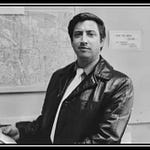
The Aftermath of a Double Homicide: When Debe Hobbs learned the DA’s office, (under Mike Schmidt’s leadership) would sentence her son’s killer, longtime criminal, con man and wife beater, Phillip Lawrence Nelson, to only ten years, she felt betrayed - betrayed and insulted. As a woman who has worked in parole and probation and a college graduate, Hobbs felt more than insulted, she felt the whole idea of justice had been perverted.
The ten year sentence is part of a growing trend in Portland and Seattle among questionable judges with extremist left leaning ideologies. Their pattern is to give violent predators ‘slap on the wrist’ sentences for serious felonies, including premeditated murder. This often results in persistent recidivism and in future murders. These judges demonstrate they care more for violent offenders than for the victims of crime and that the future murders by offenders they release means little to nothing to them.
Debe Hobbs was outraged that her son’s life and subsequent murder was worthy of only a ten year sentence. And who wouldn’t be?


Debe Hobbs son, Nate Hobbs, (along with Cassy Leaton) were murdered on the hot evening of June 16, 2020 in what numerous people believe was a planned ambush attack of premeditated murder by a career criminal who had an obsession with knives.
After four long years of waiting, because Nelson kept firing attorneys, (an old jailhouse trick) several things went wrong with the trial. This was due in large part to an extremist Judge, Eric Dahlin, who allowed the defense to prevail at the expense of the prosecution. He disregarded what many consider to be a preponderance of evidence indicating the 2020 attack was entirely premeditated, and allowed the defense far more leeway in their questioning tactics, than he did with the prosecution, who he silenced regularly during cross examination.
The testimony of Hobbs family members, the other conned tenants - a black man and a Native American man - and testimony from a PPB police officer, Zachary Nell, along with Phillip Nelson himself, indicate a documentable level of premeditated planning and execution that bordered on obsessive. So, what happened?
As a writer and researcher, I have spent the last several weeks speaking with Debe Hobbs on the telephone - we have further communicated via Facebook, email, and telephone text messages. I have seen photos, documents and have viewed several disturbing videos of the trial as well.
In my and Debe Hobbs opinion, the trial, (which began April 8, 2024 and concluded April 26, 2024) could have been done differently and with a more just and fair outcome. A fair trial could have been possible had the jury been able to hear from more witnesses who knew Nate Hobbs and Cassy Leaton, and understood the premeditation and planning that went into the murder.
When looking at everything, as a whole, it becomes clear the Judge, Eric Dahlin, (a liberal judge appointed by Kate Brown in 2016) brought his own ideological biases into the courtroom. After Hobbs examined all the available evidence, (particularly surveillance videos she saw numerous times) it became clear what had actually happened in 2020 was an act of premeditated murder.
When speaking of the trial, Hobbs had this to say:
“There is so much corruption and I have seen it. Every day for 3 weeks all I could do was cry. Then when the sentencing came out, all I could think is… my son never got justice in this world! He never got justice! He never got justice from this jury that saw the 12 inch knife. It was explained by the medical examiner that this knife went through his body 12 inches! Through his lung, his kidney, into his liver, all at once! That’s what killed him, and… Nelson slit his throat. How are these jurors getting on? They can’t make a decision. There are some people who should not be jurors. They don’t have common sense.”
When a Jury Makes or Breaks a Case: But what could she be referring to? Was it possible incompetent jurors could have thrown the case? Debe Hobbs believes that is precisely what took place. What happens when a juror, (who may not be well educated or literate) impacts a double homicide murder trial and the complex dynamics that come into play? Can one or two ignorant jurors really throw a murder trial?
When most judges, defense attorneys and prosecutors will agree an impartial jury is a fundamental aspect to the pursuit of justice, having an impartial jury is not always possible in a trial. The reason for this is that selecting an impartial jury is virtually impossible. One primary reason is because jurors are only people and some jurors struggle with basic literacy. The most anyone can hope for is a jury that is as impartial as possible. Sadly, that almost never occurs.
The reality is every potential juror has preconceived notions about various crimes. This is based on their history, age, prejudices with regard to race, nationality, gender, sexual orientation and of course religion. When an uneducated person directs various biases toward the defendant or the victim of a crime, or even the family members of a crime victim, either consciously or unconsciously, those biases will affect their ability to render a fair verdict based upon the presented evidence. As a result that verdict will be faulty.
These kinds of biases and emotional responses can impact the mind of a juror, and in many instances jurors come to the wrong verdict. What happens when a juror engages in subtle forms of nonverbal communication? Can these forms of microaggressions constitute juror misconduct?
What Debe Hobbs noticed almost immediately were two jurors who stood out to her. Juror number 1 and Juror number 6, (both older white women) appeared to take a strange interest in Debe Hobbs and made a point of staring at her during the trial. She felt uncomfortable with the intrusive staring and should have complained, but Debe, true to her kind personality didn’t want to make waves.
Inexplicably, the two women did not appear friendly. This included Juror number 6, who one day during the trial engaged in a stare down. That afternoon, a victim rights advocate sat next to Hobbs during the first week of the three week trial.
The victims rights advocate was an African woman in traditional headdress and colorful African attire. The woman, Juror number 6, leaned forward and looked over for several minutes, leaning over her legs and turning her head, to get a better look, in an obvious and unsubtle manner. She stared for over one full minute until Hobbs and the advocate turned and returned the prolonged stare. It was strange and unusual behavior for a juror and should have been reported to the judge, Eric Dahlin, but was not. This is not uncommon in trials. Bizarre nonverbal behavior which seems strange, offensive or threatening is often not reported, due to people not wanting to cause a disturbance during the trial.
But why would two women jurors have an issue with Debe Hobbs? Could it be that she and her husband and family practice a Middle Eastern religion and gave their seven children names according to that religion? Though Nate’s full first name was Najef, he preferred being called Nate. Could it be that these two women decided Debe Hobbs and her children were a certain way, because of that? Or perhaps it was because Nate Hobbs and Cassy Leaton had past struggles with Methamphetamine use?
What of the Motive and the Ambush Attack: Debe Hobbs points to several things Nelson did prior to the murders that indicate he engaged in an ambush attack that he had been planning for days, an attack he alluded to when he sent Officer Zachary Nell threatening emails. The emails to Nell included threats that people might be hurt if he wasn’t allowed to charge rent to the tenants he had conned, a ludicrous and nonsensical demand. Nelson later tried to sue Officer Nell, an action that was immediately tossed out of court.
From all appearances, Phillip Nelson was a complete basket case. An obviously mentally ill man with violent tendencies. But does that mean he was insane? Not in my opinion. His bizarre admissions indicate he had planned the ambush attack, prepared his weapon, and carefully prepared how he was going to exact his revenge.
In the trial, Phillip Nelson comes off like a crazy man, excited, cheerful, happy to be the center of attention. He said bizarre things, incriminating himself and sharing how he had planned the ambush murder of two people he had previously conned out of thousands of dollars.
After pretending to be the property owner of the four-plex on 14th and NE Davis Street, Nelson revealed himself to be a violent criminal and con man, living homeless, out of a filthy purple van.
Nelson’s amorality and sociopathy are disturbing, as are his complete and abject lack of any remorse or insight into his own predatory behavior. Toward the end of the trial, he was given the chance to make this ludicrous statement. It indicates a mind that is sociopathic, narcissistic and unconcerned with others, and devoid of human empathy.
“If I’d had a better understanding of the law, as I do know, my decisions leading to the death of Najaf and Cassy would have been very different,” Nelson said, turning to their families. “There is nothing that can be done to fill this void in your lives.”
At no time does Phillip Nelson acknowledge his crimes, or his long history of criminal acts, as a liar, a conman, and an opportunist stealing money from people. At no time does he apologize for murdering two innocent people with an altered machete he had sharpened himself to become a deadly weapon.
Moreover, the last statement he makes: “There is nothing that can be done to fill the void in your lives,” sounds smug, almost gloating. It is not the kind of “apology” that one would expect from someone genuinely sorry that they murdered two unarmed people, in a cold blooded ambush attack.
But why would someone like Phillip Nelson be sorry anyway? Clearly, having empathy and concern for others is something he never learned while growing up. On a Facebook post, made a couple of years before the murders, Nelson complains that his father has “disowned” him, but does not provide any backstory on why. It is clear that his relationship with his parents is dysfunctional and likely abnormal. But more on that later.
When so much of the evidence points to Phillip Nelson planning the double murder, by harassing the couple, and even making threats to the Portland Police that lives would be at risk a full week before the murder, why was Nelson charged with only manslaughter in the murder of Nate Hobbs, and second degree murder in the killing of Cassy Leaton, who he stabbed in the back as she tried to flee?
Why was Nelson given 25 years for Cassy Leaton’s murder and only 10 years for Nate Hobbs?
In part 3 of this story, a timeline will be shared, along with details surrounding the surveillance video, obtained from the nearby hotel, which shows how Nelson parked his purple van, then re-parked it, and lured Cassy and Nate into the basement by turning off the water, this being the 4th time he had done so.
During his trial testimony Nelson inexplicably declared: “I was gonna sweat em’ out!” explaining why he had turned off the water. He knew that Nate would want to take a shower after his long day and that the day was hot. Nelson had planned the entire scenario and like lambs led to a slaughter, Nate and Cassy walked right into his trap.
What kind of person would do that and why? Why did Nelson direct his revenge on Nate and Cassy, and not the other two tenants he had conned? Why not go after the black man who lived in the upstairs apartment next door, or the Native American man who roomed with Cassy and Nate?
What was it about Nate that Nelson seemed to hate so much?
~Theresa Griffin Kennedy














Share this post